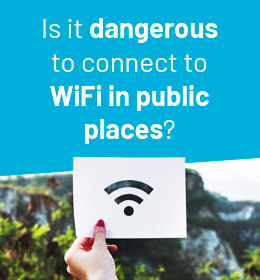
Nowadays, it is common for most people to connect to the Internet via a WiFi network. While this offers convenience and accessibility, what happens when it comes to connecting to WiFi in public places such as cafes, airports or train stations? In this article, we’ll explain the risks of connecting to WiFi in public places and give you tips on how to protect yourself and maintain your privacy online.
Contents
- 1 What is public WiFi and how does it work?
- 2 Why shouldn’t you connect to WiFi in public places?
- 3 How to protect yourself when using public WiFi
- 4 Be aware of
- 5 Hanging TV on the Wall without Visible Wires: Effective Tricks
- 6 What are the best video door entry systems for communities?
- 7 How to improve the TDT signal?
What is public WiFi and how does it work?
Before we dive into the risks, it is important to understand how public WiFi works. Simply put, public WiFi is a wireless network found in public places that allows users to connect to the Internet for free or for a fee. These networks are open to the public and do not require a password to access them.
Why shouldn’t you connect to WiFi in public places?
While it is tempting to connect to a free WiFi network in public places, there are certain risks to be aware of. One of the biggest risks is the lack of security of these networks. Because they are open to the public, anyone can access them, which means that hackers and cyber criminals can access them as well. Once you connect to the same WiFi network, hackers can access your device and your personal data.
Another common risk is the possibility of connecting to a fake or “phishing” network. Hackers can create a fake network that looks just like the legitimate WiFi network, but is designed to steal your personal data and passwords. If you connect to a fake WiFi network without realising it, your personal details are likely to be stolen.
Most common risks
- Lack of security: Public WiFi networks are often insecure because they do not have advanced security measures in place to protect users.
- Impersonation: A cybercriminal could create a fake WiFi network to impersonate a legitimate network and steal personal or financial information.
- Data espionage: Hackers can intercept and eavesdrop on data transmitted over a public WiFi network, including passwords, credit card information and personal data.
- Phishing attacks: Cybercriminals can use a public WiFi network to send phishing emails and text messages, which are deceptive and seek to trick users into revealing personal information.
- Malware: Public WiFi networks are a common place for hackers to distribute malware, which can harm your device or damage your data.
- Unauthorised connections: Hackers may attempt to connect to your device without your knowledge and access your personal information.
- Charge fraud: Some public WiFi networks may require users to enter credit card information to access the network, which can put your data at risk and expose you to unauthorised charges.
How to protect yourself when using public WiFi
Despite the risks, you can still connect to public WiFi safely if you take certain precautions. The first and most important is to make sure that the WiFi network you are connecting to is legitimate. Ask the venue staff if they have an official WiFi network or search online for the name of the WiFi network before connecting.
You should also make sure that the website you are accessing starts with “https://” instead of “http://”. The “s” means that the page is encrypted and protected, which reduces the risk of your data being stolen.
Another important precaution is to use a VPN or virtual private network. A VPN encrypts your Internet connection and protects your personal data from hackers and cyber criminals. You can also disable file sharing and network connection settings on your device when connecting to public WiFi.
Be aware of
Connecting to public WiFi in public places can be risky due to the lack of security and the possibility of connecting to a fake network. However, by following certain precautions such as verifying the authenticity of the WiFi network, using a VPN and disabling file sharing settings, you can still connect to public WiFi safely. Always remember to be vigilant and take the necessary precautions to protect your privacy and security online. In addition, it is important to remember that not all public places offer secure and legitimate WiFi, so you should always be careful when connecting to an unknown WiFi network.
Ultimately, the best way to protect your data and privacy is to avoid connecting to public WiFi in public places and instead use your own data plan or a secure connection at home or in the office. If you do need to connect to public WiFi at some point, be sure to follow the precautions above to minimise the risks.






